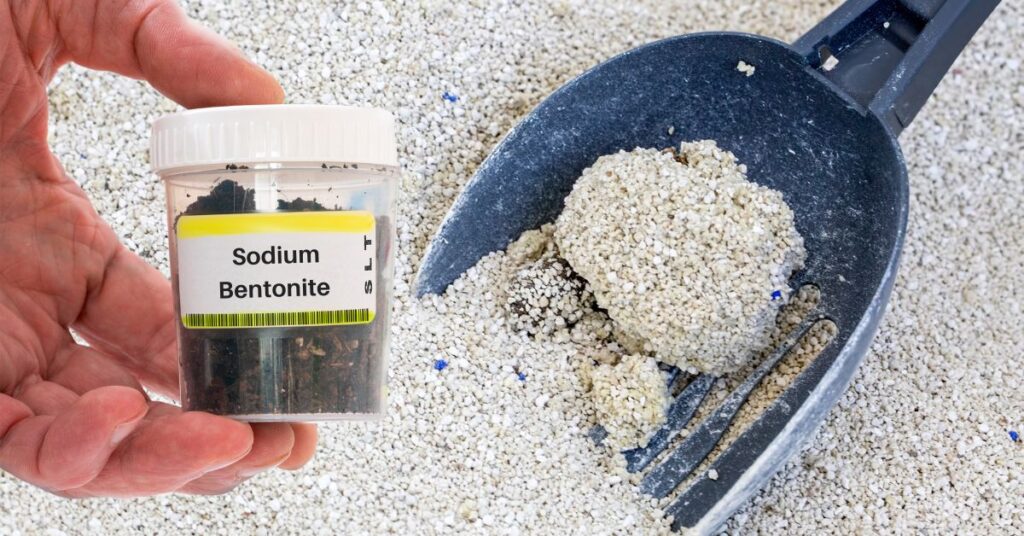Imagine a substance that can transform soil into a leak-proof barrier or provide the perfect foundation for construction projects. Sodium bentonite is a powerful natural clay that enhances soil properties, providing both sealing and stability. But what makes sodium bentonite so valuable for various soil applications? Let’s explore its unique characteristics, uses, and benefits in detail.
Understanding Bentonite Clay
Bentonite clay is a unique type formed millions of years ago from the weathering of volcanic ash. As part of the smectite group of minerals, bentonite primarily comprises hydrated aluminum silicate, or montmorillonite, responsible for its distinctive properties.
What is Montmorillonite?
Montmorillonite is the main mineral component in bentonite clay. It is highly absorbent and can expand significantly when exposed to water. This characteristic makes bentonite an effective sealant and stabilizer in various applications. The montmorillonite content can vary considerably from one bentonite deposit to another, which affects its swelling capacity and overall effectiveness.
Types of Bentonite Clay
There are several types of bentonite, but the two most common are:
- Sodium Bentonite: Known for its high swelling capacity, it can expand 12 to 24 times its original size when hydrated. It is commonly used for soil sealing and stabilization.
- Calcium Bentonite: This type has lower swelling properties and is often used in applications that require moderate absorption, such as in cat litter or as a dietary supplement.
How Does Sodium Bentonite Work in Soil?
When sodium bentonite is added to soil, it transforms, creating a dense, impenetrable barrier. This clay’s ability to absorb water and expand is critical to its effectiveness in various soil applications.
The Swelling Mechanism
Upon contact with water, sodium bentonite absorbs moisture and swells. This swelling fills the gaps and pores within the soil, creating a watertight barrier that prevents water from passing through. The finer particles of bentonite also bind soil particles together, enhancing soil stability and reducing erosion.
Forms of Sodium Bentonite
Sodium bentonite is available in different forms to suit various applications:
- Granular Form: This resembles cat li used for pond and dam sealing where a thicker, uniform layer is needed.
- Powder Form: This fine powder is ideal for mixing with soil to improve water retention and stability.
Applications in Soil and Construction
Sodium bentonite’s unique properties make it highly versatile and valuable in various soil and construction applications.
1. Pond and Dam Sealing
How Sodium Bentonite Seals Ponds
Sodium bentonite is frequently used to seal ponds, lakes, and dams. When spread over the base and sides of a pond, the clay swells upon contact with water, filling in cracks, holes, and gaps. This expansion forms an impenetrable barrier, preventing water loss due to seepage.
Steps for Effective Pond Sealing
- Surface Preparation: Remove debris, rocks, and vegetation from the pond base and sides.
- Application of Bentonite: Spread a uniform layer of granular bentonite across the prepared surface.
- Compaction: Use a roller or heavy machinery to compact the bentonite layer, ensuring it penetrates the soil.
- Watering: Add water gradually to activate the swelling process, allowing the bentonite to expand and seal any gaps.
2. Landfill Liners and Caps
Using Sodium Bentonite in Landfills
In landfill construction, sodium bentonite is a liner and a cap. It is placed at the base as a liner to prevent leachate, the liquid that drains from the landfill, from contaminating the surrounding groundwater. As a cap, it prevents rainwater from entering the landfill, reducing leachate production.
Benefits of Sodium Bentonite in Landfills
- Environmental Protection: Prevents harmful chemicals and waste from seeping into the groundwater.
- Cost-Effectiveness: Offers a more affordable solution compared to synthetic liners.
- Durability: Provides long-term performance with minimal maintenance.
3. Foundations and Construction Sites
Enhancing Soil Stability for Construction
In construction, sodium bentonite improves soil stability, especially in loose or sandy soil areas. By mixing bentonite with soil, the clay binds the particles together, creating a solid foundation that resists shifting, cracking, and erosion.
Applications in Foundation Construction
- Building Foundations: Ensures a stable base for residential and commercial buildings.
- Road Construction: Improves the load-bearing capacity of roadbeds, reducing the risk of subsidence or collapse.
- Slope Stabilization: Prevents landslides and erosion on hillsides and slopes.
4. Creating Slurry Walls
What are Slurry Walls?
Slurry walls are underground barriers that prevent water flow in construction projects, such as basements, tunnels, and underground storage facilities. Sodium bentonite is mixed with water to create a thick slurry that is pumped into the ground, where it hardens to form a watertight barrier.
Advantages of Using Bentonite Slurry Walls
- Effective Water Control: Prevents water infiltration and protects underground structures.
- Flexibility: Can be easily shaped to fit specific project requirements.
- Cost Savings: Reduces the need for more expensive waterproofing materials.
5. Soil Improvement for Agriculture
Improving Soil Quality for Crops
Sodium bentonite is also valuable in agriculture, improving soil structure and moisture retention. It is especially beneficial in sandy soils, where water drains quickly, leaving crops thirsty. Farmers can help the soil retain water by adding bentonite, reducing irrigation needs and improving crop yields.
Benefits for Agricultural Soil
- Moisture Retention: Helps retain water, reducing the frequency of irrigation.
- Erosion Control: Binds soil particles together, preventing erosion caused by wind and water.
- Soil Conditioning: Improves soil structure, making it easier for roots to penetrate and absorb nutrients.
Benefits of Using Sodium Bentonite in Soil
Waterproofing and Sealing
The primary advantage of sodium bentonite is its ability to form an impenetrable barrier that prevents water from leaking through the soil. This makes it ideal for lining ponds, sealing dams, and constructing landfill liners.
Enhanced Soil Stability
By swelling and binding soil particles, sodium bentonite significantly enhances soil stability. This property is essential in construction projects where the ground must be solid and resistant to shifting.
Natural and Eco-Friendly
Being a natural clay, sodium bentonite is environmentally friendly and does not contain harmful chemicals. This makes it safe for use in various applications, including those in agricultural and residential settings.
Cost-Effective Solution
Sodium bentonite offers a cost-effective solution compared to synthetic liners and stabilizers. Its natural availability and efficiency in sealing and stabilizing soil make it an affordable choice for many projects.
Factors Affecting the Effectiveness of Sodium Bentonite
Quality of the Bentonite Deposit
Not all bentonite deposits are created equal. The effectiveness of sodium bentonite largely depends on its montmorillonite content, which determines its swelling capacity. Choosing high-quality bentonite from reputable sources is essential to ensure the best results.
Application Technique
Proper application is critical to maximizing the benefits of sodium bentonite. For instance, when using it to seal a pond, the clay must be evenly spread and compacted to form a continuous, impermeable layer. Incorrect application can result in leaks and ineffective sealing.
Environmental Conditions
The effectiveness of sodium bentonite can also be influenced by environmental conditions such as temperature, humidity, and soil composition. For example, extremely dry or sandy soils may require more bentonite to achieve the desired sealing or stabilization effect.
Comparing Sodium Bentonite to Other Types of Clay
Sodium vs. Calcium Bentonite
While both sodium and calcium bentonite are derived from volcanic ash, they have distinct properties:
- Swelling Capacity: Sodium bentonite can swell up to 24 times its original size, while calcium bentonite swells far less. This makes sodium bentonite more effective for sealing and waterproofing applications.
- Absorbent Qualities: Calcium bentonite is more commonly used in products that require moderate absorption, such as cat litter or skincare products, whereas sodium bentonite is preferred for soil and construction applications due to its superior sealing capabilities.
Conclusion
Sodium bentonite is a versatile and natural solution for various soil and construction needs. Its unique ability to expand and create an impenetrable barrier makes it ideal for pond and dam sealing, landfill liners, construction foundations, and agricultural soil improvement. Whether used for waterproofing, enhancing soil stability, or protecting the environment, sodium bentonite provides a practical, eco-friendly, and cost-efficient solution.
FAQs
What makes sodium bentonite a good choice for soil applications?
Its high swelling capacity and ability to create a watertight barrier make it ideal for waterproofing, sealing, and soil stabilization.
How is sodium bentonite applied to seal a pond?
It is spread evenly over the base and sides, compacted, and then watered to activate its swelling and sealing properties.
Can sodium bentonite be used in agricultural soil?
Yes, it improves water retention, reduces erosion, and enhances overall soil health, which benefits crop growth.
What factors should be considered when selecting sodium bentonite?
The quality of the clay, its montmorillonite content, and the specific application method are crucial factors for effectiveness.
Is sodium bentonite safe for the environment?
It is a natural, non-toxic product that does not harm the environment, making it suitable for various applications.



